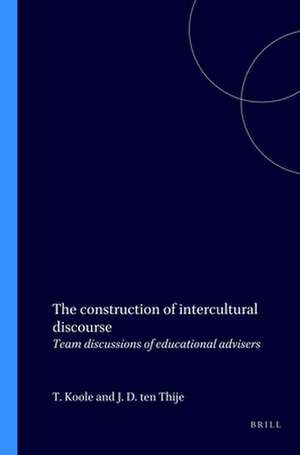The construction of intercultural discourse: Team discussions of educational advisers: Utrecht Studies in Language and Communication, cartea 2
Autor Tom Koole, Jan D. ten Thijeen Limba Engleză Paperback – 31 dec 1993
The teams consist of Dutch, Turkish, Moroccan, and Surinamese educational experts whose job it is to advise schools and teachers on the form and content of language teaching.
Their meetings are structured according to institutional patterns, such as 'interactive planning' and 'reporting', and according to intercultural discourse structures. For instance, Dutch team members identify their immigrant colleagues as 'immigrant specialists' and are themselves identified as 'institutional specialists'. Further, the intercultural pattern 'thematizing and unthematizing racism' provides the team members with communicative methods to deal with the societal contradictions that exist between different cultural groups, in the Netherlands as well as elsewhere. These intercultural discourse structures concur with the institutional patterns so that, for instance, they affect the outcomes of planning discussions.
Most studies on intercultural communication focus on misunderstandings and miscommunications. This book demonstrates that also communication without miscommunication can be shown to be intercultural.
Preț: 386.23 lei
Preț vechi: 454.39 lei
-15% Nou
Puncte Express: 579
Preț estimativ în valută:
73.91€ • 80.26$ • 62.09£
73.91€ • 80.26$ • 62.09£
Carte indisponibilă temporar
Doresc să fiu notificat când acest titlu va fi disponibil:
Se trimite...
Preluare comenzi: 021 569.72.76
Specificații
ISBN-13: 9789051836004
ISBN-10: 9051836007
Dimensiuni: 155 x 235 mm
Greutate: 0.43 kg
Editura: Brill
Colecția Brill
Seria Utrecht Studies in Language and Communication
ISBN-10: 9051836007
Dimensiuni: 155 x 235 mm
Greutate: 0.43 kg
Editura: Brill
Colecția Brill
Seria Utrecht Studies in Language and Communication
Cuprins
1: Immigrant employees in a Dutch institution. Part One: Introduction. 2: Immigration multilingualism and educational advice in the Netherlands. 3: Research methods and corpus. Part Two: Towards a model for the analysis of intercultural communication. 4: Intercultural communication and the concept of culture. 5: The pragmatics of multilingualism. Part Three: Analyses. 6: A pragmatic analysis of educational advising. 7: Different perspectives in reporting. 8: Making plans in interaction. 9: The meaning of institutional key words. 10: The interference of intercultural and institutional positions. 11: Thematising and unthematising racism. 12: Conclusions.
Recenzii
"Appearing at a time of increased interest in discourse analysis and collaborative activity, this book contributes to our understanding of the complexity of group communication in any culture or situation." - in: Journal of Technical Writing and Communication, Vol. 25, No. 2 (1995)
"As an analysis of discourse structures, the investigation has a great deal to recommend it. … The conceptual grounding and some of the findings of the study are exemplary and important in many respects. … As a case study with significant implications for other settings, then, the book is a resounding success." - in: Discourse and Society 6(4) (1995)
"A simulating contribution to the analysis of intercultural communication, both from a methodological and theoretical point of view." - in: Migrantenstudies (Migrant studies), Vol. 11, No. 4 (1995)
"As an analysis of discourse structures, the investigation has a great deal to recommend it. … The conceptual grounding and some of the findings of the study are exemplary and important in many respects. … As a case study with significant implications for other settings, then, the book is a resounding success." - in: Discourse and Society 6(4) (1995)
"A simulating contribution to the analysis of intercultural communication, both from a methodological and theoretical point of view." - in: Migrantenstudies (Migrant studies), Vol. 11, No. 4 (1995)















